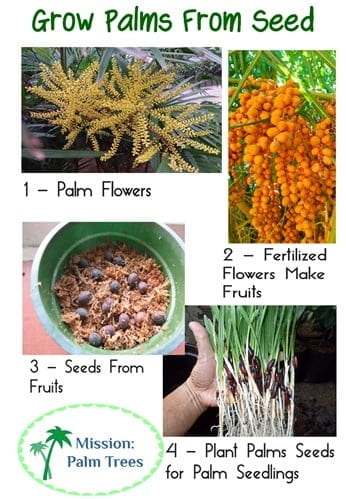- Home
- Tips to Grow Palms
- Grow From Seed
Grow Palm Trees From Seed
You're thinking if there's a way to grow palm trees from seed.
Patience, care, and investigation into the palm species you'll grow are needed. Because palms aren't like trees. You can't use frond branches as cuttings to propagate a new palm tree.
Growing a new palm tree nearly only comes from planting palm tree seeds.
Whether you're totally inexperienced or have some knowledge, we'll help you with a step by step guide to successfully sprout palms from seed:
OR CONTINUE READING ON FOR ALL BEST PRACTICES TO START SPROUTING PALM SEEDS:
Your Step-by-Step Guide to Growing Palm Tree Seeds
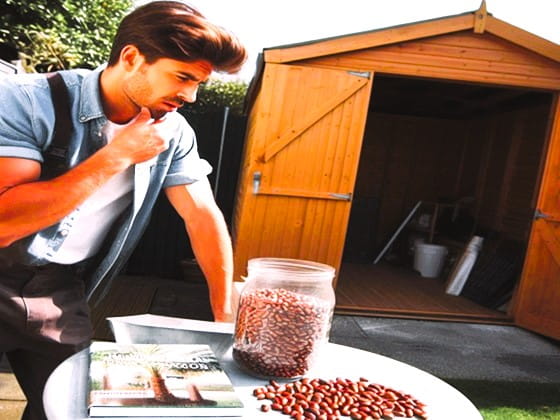
Feeling overwhelmed by so many palm trees?
You're not alone. We Understand your headaches! At Mission: Palm Trees you'll find clear answers to questions & Step-By-Step Guidance, from real people. With solutions to help. No puzzling shoptalk. No tiring research. So it's easy & fun for you.
How to Find Types of Palm Tree Seeds
First things first: where can you get the seed of a palm tree?
You'll want to plant the right palm in the right place. So be sure your chosen palm seeds will work:
- Climate Growing Zone - will it fit with yours?
- What sunlight will your transplanted palm tree sapling need?
- Watering - will your palm tree grown from seed get regular rain, or are you in the desert?
If you're already growing palms, you have your own automatic palm seed pod source.
Or maybe you'd like this to be a sideline Entrepreneurial Venture, to sell palm sprouts grown with seeds. Whether it's coveted rare palm tree seeds, or more palm common species.
We'd advise using an authentic palm seed supplier with fresh, high quality seeds, when planning to grow palm trees from seed.
- Local nurseries may have ones that will do well for you.
- Palm tree seeds for sale can be found at Palm Talk>
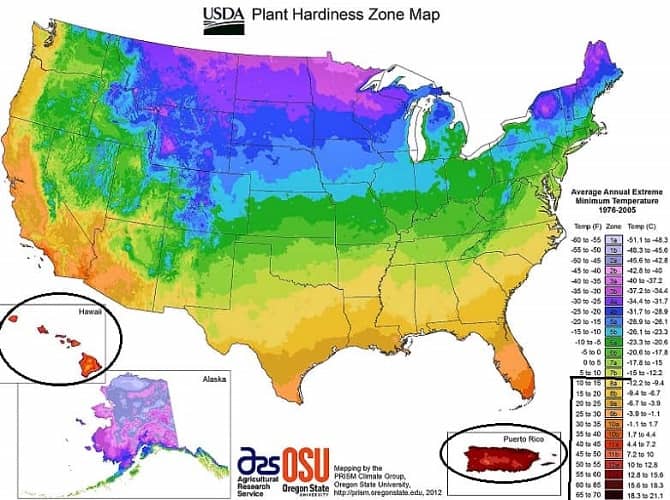 What is Your Climate Growing Zone for Growing Your Palm Tree Seeds?
What is Your Climate Growing Zone for Growing Your Palm Tree Seeds?Understanding Palm Seed Germination
Palm seeds come in many sizes.
From about 1/4in/0.6cm to the largest seed among all flowering plants, the Double Coconut.
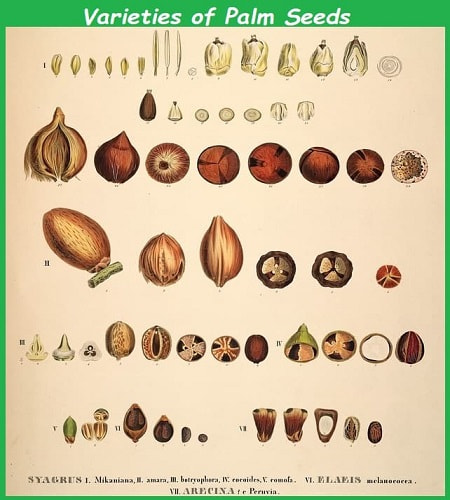 Pictures of Palm Tree Seeds
Pictures of Palm Tree SeedsHow Palm Trees From Seeds are Started
First, Palm Trees Grow inflorescences. That's the palm stem where flowers bloom.
- Flowers are pollinated, leading to fruits.
- Fruits usually contain a single palm seed pod for growing their reproductive offspring - a new palm!
Successful growth from planting palm tree seeds doesn't often get overwhelming results. Although we know of those who've gotten about 90% palm tree seedling success! Most see as little as 20%.
How long does it take for palm tree seeds to germinate? For good results when you grow palm trees from seed, your proper steps & patience are important.
Two Ways for Palm Tree Seedlings to Grow
Germinating palm seeds grow best in two different ways.
- Kind of like picking a side trip.
- Or sticking together with the palm seed.
Mission: Palm Trees is made possible by readers like you! If you purchase via a link/ ad here, we may earn a small commission. At no added cost to you. Thanks for your support! Learn more>
Remote Palm Seed Germination: Growing Roots Down
Many palm seeds Need a Deep Pot so their first root has plenty of room to grow.
Most have remote palm seed germination. Which means the roots grow downward. (See more in Our FAQ.) Therefore it's important to use deep pots.
Like for the Mediterranean Fan Palm (Chamaerops humilis)!
Adjacent Germination: Roots Spreading Out
Part of the new leaf stem comes out of the seed, making a "button."
The stem & palm root growth begin from this button. Soon roots spread outward. They're called adventitious roots.
A Quick Quiz About the Best Pot for Palm Seeds Planting
YOUR QUESTION: Which seeds of palm trees need planting in a deep plant starter pot for best results?
Seeds From Palms with Adjacent Germination
OR
Seeds on Palm Trees with Remote Germination
The Best Pot to Germinate Palm Trees for Some
THE ANSWER IS...
Remote Germinators, to give enough downward room for the root growth.
These types of palm tree seeds are examples: From the Mexican Fan (Washingtonia robusta), Chinese Fan (Livistona chinensis), Bismarck (Bismarckia nobilis) & Palmyra (Borassus flabellifer). All needing remote germination.
How To Germinate Palm Seeds - Get Started
For great results, know the best procedures.
Best Time for Growing Palm Trees from Seed
What are the best conditions for germinating palm tree seeds?
Species each have their exact temperatures for planting seeds. But in general, plant palm seeds in warmer months.
For most palms, the freshest, ripe seeds have the most successful outcome.
THE FIRST STEP to growing is starting with ripe seed pods on palm trees.
- Even as soon as they've fallen.
- Avoid those that have dried out.
- Prevent those you've gathered from drying out. By starting subsequent planting steps soon.
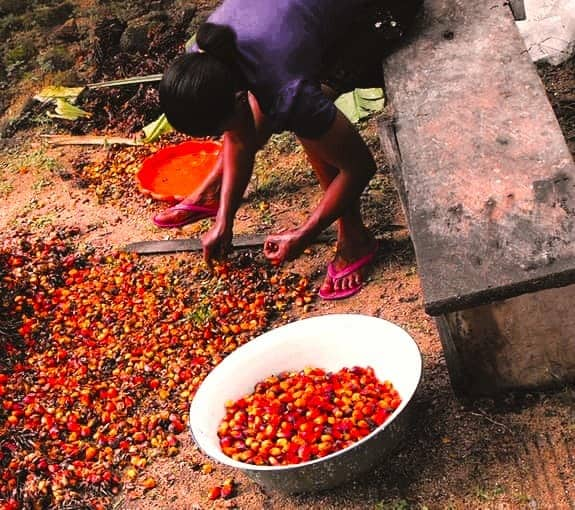 Choosing Fresh Palm Fruits for Viable Seeds
Choosing Fresh Palm Fruits for Viable SeedsPhoto: Yemisi Ogbe - CC BY-SA 4.0
Step 2: Palm Seed Preparation
How do you prepare palm tree seeds before planting?
Get your palm seeds ready by the Soaking of Palm Seeds.
This water soak is the best pretreatment for germination in most all palm species.
- Your palm seed will enjoy taking a nice, long bath! Soak the seeds in warm water for about 36-48/+ hours.
- Change the water once per day.
- Can you dent into the fruit's skin or outer layer (epicarp)? It's ready to begin the next step: cleaning them.
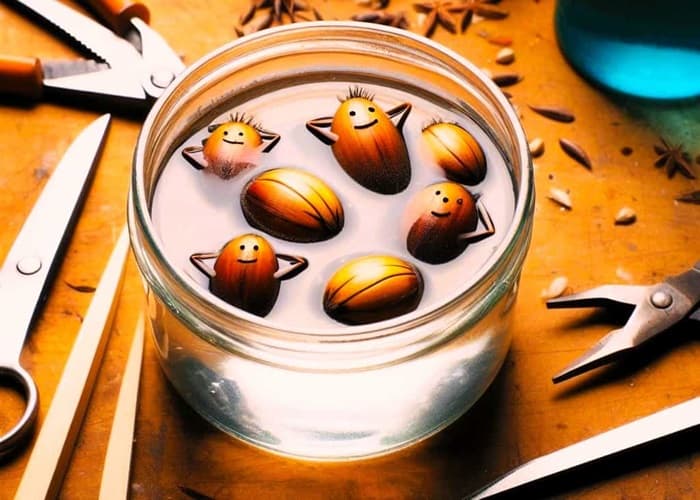 Aaaah, this is the life! 😉
Aaaah, this is the life! 😉Step 3: Cleaning the Palm Seed Pod
Most choose the first choice, but you can try the second:
BY HAND - Manually clean the seed. Fairly time-consuming if you're planting many palm seeds.
- Clean away skin. And the fleshy fruit or pulp area (mesocarp). Use a knife for this.
- For any mesocarp remaining, use a scrubber (The Scrub Daddy or similar) while the seed's under running water.
BY MACHINE - Many commercial growers have a Seed Cleaning Machine. If you ask, they may be willing to clean your palm seeds. Likely for a price.
Commercial Seed Cleaning
More Steps to Growing Palm Trees From Seed
What more do I need to prepare palm seeds for planting?
Step 4: Get That Seed of a Palm Tree Ready to Plant
What are common problems when germinating palm seeds, and how do I fix them?
Palm seeds often have a tough outer layer. Making it hard for water to get in. Which can slow down sprouting.
Step 4a: Scratching the Seed Shell
Some seeds have a hard shell.
Make your palm seeds ready to grow using this method: Scarification. Scratching the shell a little allows in moisture.
- Be careful when doing this so you don’t damage the seed inside the shell.
- Here's useful details from those Familiar With the Process>
- We don’t recommend using chemicals unless you’re a professional grower with lots of experience.
Step 4b: Using Heat or Cold to Help Seeds Grow
Getting seeds ready by using temperature is called Stratification.
You can Heat Seeds to help them sprout faster.
- Heat Pads or Space Heaters can be used for this process.
- There’s not much scientific palm seed research about this.
Putting Seeds in a Cooler place sometimes works, for certain palm species. Especially in places with milder weather for growing cold-hardy palms.
Steps to Planting Palm Tree Seeds Properly
We've sourced Expert Tips For You, when sowing your palm tree seeds.
It's the exciting part, where your soon-to-be palm tree seedlings come to life. Here's the step by step process...
FIRST STEP
Decide whether to use pots or flats with essential drainage holes.
Usually pots are preferred, because the depth allows for better root growth. That deepness eventually makes easier transplanting.
Some choose Seedling Tubes. Or you can create your own version using PVC Piping. Which you could Cut to Needed Lengths, about 12in/30.5mm.
If by chance you're planting palm seeds in a Flat Type of Container, you'll want to space out the seeds so roots don't entangle with each other.
SECOND STEP
What is the best soil mix for growing palm trees from seed?
Base your planting soil (substrate) decision on the fact that seeds & seedlings need consistent moisture, without sogginess. The substrate shouldn't fully dry out. But yet don't overwater.
Prepare Your Own Good Palm Seed Starter Mix:
One suggestion is using a mix of 2:1 ratio of Organic Peat Moss to Organic Perlite.
Pour the this mix into a pot, leaving some space at the top.
OR rather than all peat moss, divide that in half for including Cocopeat. Or try Coconut Coir (we've used This Brand with good results). Especially good when you grow palm trees from seed in warmest climes. Being mindful of preventing soil from drying out.
It would then be a 1:1:1 ratio. Being equal portions of Peat Moss, mixed with Coconut Coir, and then adding in Organic Vermiculite.
HERE'S AN EXAMPLE, WITH 2 METHODS
THIRD STEP
Palms seeds aren't planted too deeply.
Follow these general rules of thumb (or green thumb in this case 😏). The best way is to gently plug the palm seed into the potting mixture.
- Let large seeds slightly show above the mix.
- Small seeds no more than 1/2-in/1cm below the surface.
FOURTH: WATERING
Once your seeds are snug in their pots, it's time for thorough, yet gentle watering.
- Misting setting gives best results.
- Keep the substrate moist but not waterlogged, like a flooded rainforest!
FIFTH: TEMPS
Most palm seeds need higher temps for germination. Best between Fahrenheit of 86o-95o/30-35c). Better to sow palm seed in warmer months.
To help keep temperatures in the best range, cover the seed container with clear plastic. Or use bottom heating by using a Seedling Heat Pad, but out of direct sunlight. This helps create a greenhouse effect, maintaining the warmth and humidity necessary for germination.
Remember as soon as sprouting young plants appear, remove the plastic or heating pad.
The Latest at MPT
-
Best Palm Trees for Arizona - Which to Choose for Your Landscape
The best palm trees for Arizona can nicely fit many landscapes. We show you hardy and resilient palm trees that do well under the Arizona sun.
FAQ for Growing Palm Trees From Seed
What are the best conditions for germinating palm tree seeds?
What are the best conditions for germinating palm tree seeds?
Warmth is probably the most important of all. Each species has its own best temperature for germination.
- For instance Cold Tolerant Palms can produce seedlings at 59oF/15oC up to 77oF/25oC.
- But most palms need germinating temps of 86oF/30oF. Even up to as high as 104oF/40oC.
- For most palms mid-range between the two is best. About 85oF/30oC to 95oF/35oC.
Other important conditions are consistent soil moisture, without being marshy. Also palm seeds need good humidity & regular light.
How do I germinate palm tree seeds quickly?
How do I germinate palm tree seeds quickly?
Because you wonder how long does it take for palm seeds to germinate? Following the steps we've given will have quickest results for growing palms from seed.
But remember, palms don't quickly germinate. Most sprout in about 1-6 months. But some even take up to six months for germination.
These conditions can slow or damage sprouting.
- Improper surrounding temperatures.
- Allowing the seed to switch between drying and overwatering, without good drainage.
- Using fertilizer in the seed's potting soil too early. That leads to algae & moss growth, which deteriorates soil. New seedlings don't need fertilizer until the 3rd month after sprouting.
Which palm tree species are easiest to grow from seed?
Which palm tree species are easiest to grow from seed?
Sabal palmetto palm seeds are the answer for those in 8-11 USDA growing climates. Warmest microclimates of 7b, too. By following the steps here results take about 1 month.
What are the best palm tree seeds for beginners?
What are the best palm tree seeds for beginners?
Queen palm seeds sprout pretty easily in Growing zones 9-11. Phoenix rupicola (Cliff Date) & P.roebelinii in 9b-11.
Can I grow a Coconut Tree from seed?
Can I grow a Coconut Tree from seed?
Yes, it's possible! If your growing zone is 10b-11.
But remember it's a very tall palm. Wise Landscape Planning should be included.
Swish a coconut around & listen for the sloshing milk inside. That means the Coconut Seed is alive & active. The inner seedling may already be starting up! Removing the husk is not even needed. Just Plant It Properly.
Palm Tree Seed Germination: What Can You Expect?
Gardening patience is what you need now.
Many palms are slow with their seed germination. It can take several weeks or even months!
During this time your primary task is maintaining the pot's environment. Ensure the mix remains moist, and the temperature stays warm.
What care is needed after palm tree seeds begin to sprout? When your baby palm tree seed pops from the soil, remove any plastic covering.
- Let it bask in indirect sunlight.
- Begin reducing watering to prevent root rot. Yet, don't let the soil dry out.
- And continue supplying humidity.
Transplanting Palm Tree Seedlings
Do you see roots coming from drainage holes?
The pot has become too small for the sprouted palm. It's time to transplant to a larger pot or directly outdoors.
- When transplanting outside, be sure the intended area has good drainage. You might mix some Organic Matter into the native soil before planting.
- Make the hole planting hole twice the width of the pot.
Most important is the planting depth of your seedling.
- Soil should be 1-in/2.54cm above where the roots meet the shoot stalk.
- Palm seedlings need fertilizer top-dressing after 2 months from germination. Scatter granules out to 6-12in/15-30cm from the root ball.
- Use a Higher Nitrogen Fertilizer which the palm needs for success in the coming six months. Then switch to a Normal Fertilizing schedule
Post transplantation, keep the freshly planted palm well-watered every other day for 6-8 months. While the palm establishes itself.
Takeaways When Growing Palm Trees From Seed
There you have it, a step-by-step simple guide on how to grow palm trees from seed.
It might be riddled with ups & downs, or slow progress when beginning to grow palm trees from seed. But you'll take pride in witnessing life unfurl from the seed you planted and nurtured.
It was hard, but careful work!
